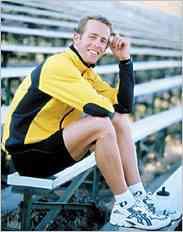 Steve Larsen was a former American professional road cyclist, a teammate of Lance Armstrong on the Motorola cycling team, who also enjoyed successful careers with mountain biking, track cycling, and cyclocross before turning to triathlon. Larsen's career is well chronicled in an article at Slowtwitch. He collapsed with sudden cardiac death during a track running workout in Bend, Oregon on May 29, 2009 at age 39 and is survived by his wife and five young children. An autopsy showed severe coronary artery disease (CAD), blockages in the coronary arteries that are the typical cause of myocardial infarction, or "heart attack." Dr. Alex McDonald offers a nice article about CAD and its implications at xtri.com. I'll also share a link to a website with a collection of photographs and kind rememberances about Larsen.
Steve Larsen was a former American professional road cyclist, a teammate of Lance Armstrong on the Motorola cycling team, who also enjoyed successful careers with mountain biking, track cycling, and cyclocross before turning to triathlon. Larsen's career is well chronicled in an article at Slowtwitch. He collapsed with sudden cardiac death during a track running workout in Bend, Oregon on May 29, 2009 at age 39 and is survived by his wife and five young children. An autopsy showed severe coronary artery disease (CAD), blockages in the coronary arteries that are the typical cause of myocardial infarction, or "heart attack." Dr. Alex McDonald offers a nice article about CAD and its implications at xtri.com. I'll also share a link to a website with a collection of photographs and kind rememberances about Larsen. 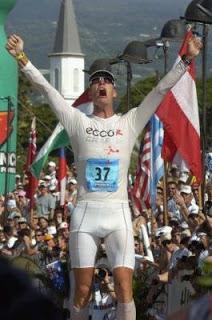 Torbjorn Sindballe was a Danish professional triathlete whose career highlights include wins at the 2000 and 2006 ITU long course world championships and a 3rd place finish at the 2007 Ironman World Championship (pictured above). Starting in 2005 he was bothered by intermittent chest pains and underwent evaluation that showed he had a bicuspid aortic valve (BAV). I've written about this condition here at the blog. At the time of his diagnosis, his aorta had a normal diameter and there was no problem with the aortic valve. He continued to compete, with occasional re-evaluation. On June 30, 2009 he announced his retirement from triathlon, citing concerns about enlargement of the aorta or damage to the aortic valve with continued participation. There is a great Q&A with Sindballe in an article at Slowtwitch where he is very candid about his heart problem. Sindballe now exercises recreationally and is a member of Ironheart Racing Team, a Seattle-based team of multisport athletes from all over the country (and world) with various heart problems.
Torbjorn Sindballe was a Danish professional triathlete whose career highlights include wins at the 2000 and 2006 ITU long course world championships and a 3rd place finish at the 2007 Ironman World Championship (pictured above). Starting in 2005 he was bothered by intermittent chest pains and underwent evaluation that showed he had a bicuspid aortic valve (BAV). I've written about this condition here at the blog. At the time of his diagnosis, his aorta had a normal diameter and there was no problem with the aortic valve. He continued to compete, with occasional re-evaluation. On June 30, 2009 he announced his retirement from triathlon, citing concerns about enlargement of the aorta or damage to the aortic valve with continued participation. There is a great Q&A with Sindballe in an article at Slowtwitch where he is very candid about his heart problem. Sindballe now exercises recreationally and is a member of Ironheart Racing Team, a Seattle-based team of multisport athletes from all over the country (and world) with various heart problems.  Normann Stadler is a retired German professional triathlete whose career highlights included wins at the 2004 and 2006 Ironman World Championships. More recently, as shown in the picture, he was a member of the Commerzbank Triathlon Team. In the summer of 2011 he was bothered by chest seemingly mild breathing difficulties and an unexplained fall-off in performance and sought evaluation. He was found to have bicuspid aortic valve (BAV), severe aortic valve regurgitation (leaking), and a very large (7 cm) aortic aneurysm of the ascending aorta. He underwent urgent surgery on July 4, 2011 for repair of his aortic valve and replacement of the beginning portion of the aorta. I've written here at the blog about athletes and BAV and shared some thoughts in an article at Endurance Corner about the surprising turn of events for Stadler. Stadler gives a great interview with Bob Babbitt, sharing his thoughts about his heart troubles. It's a remarkable story.
Normann Stadler is a retired German professional triathlete whose career highlights included wins at the 2004 and 2006 Ironman World Championships. More recently, as shown in the picture, he was a member of the Commerzbank Triathlon Team. In the summer of 2011 he was bothered by chest seemingly mild breathing difficulties and an unexplained fall-off in performance and sought evaluation. He was found to have bicuspid aortic valve (BAV), severe aortic valve regurgitation (leaking), and a very large (7 cm) aortic aneurysm of the ascending aorta. He underwent urgent surgery on July 4, 2011 for repair of his aortic valve and replacement of the beginning portion of the aorta. I've written here at the blog about athletes and BAV and shared some thoughts in an article at Endurance Corner about the surprising turn of events for Stadler. Stadler gives a great interview with Bob Babbitt, sharing his thoughts about his heart troubles. It's a remarkable story. 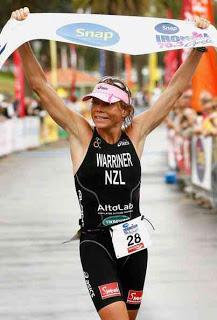 Samantha Warriner is a professional triathlete from New Zealand whose career includes an overall ITU World Cup series win.She recalls problems with irregular rapid heart beat as a child, but no specific diagnosis was made back then.This arrhythmia problem became worse as her career progressed in triathlon and was particularly bothersome in the 2010 season and especially during the run portions of 70.3 races.She can recall episodes where her heart rate would be as high as 230 beats per minute.With careful evaluation, she was found to have a supraventricular tachycardia (SVT)--ana rhythmia that involves the upper chambers (atria) of the heart--and underwent a successful ablation procedure for this arrhythmia at age 29 on December 1, 2010.She made a quick recovery and went on to be the winner at the Ironman New Zealand race in March, 2011, just 3 months later.You can read an interesting Q&A with Warriner in an article at Slowtwitch.
Samantha Warriner is a professional triathlete from New Zealand whose career includes an overall ITU World Cup series win.She recalls problems with irregular rapid heart beat as a child, but no specific diagnosis was made back then.This arrhythmia problem became worse as her career progressed in triathlon and was particularly bothersome in the 2010 season and especially during the run portions of 70.3 races.She can recall episodes where her heart rate would be as high as 230 beats per minute.With careful evaluation, she was found to have a supraventricular tachycardia (SVT)--ana rhythmia that involves the upper chambers (atria) of the heart--and underwent a successful ablation procedure for this arrhythmia at age 29 on December 1, 2010.She made a quick recovery and went on to be the winner at the Ironman New Zealand race in March, 2011, just 3 months later.You can read an interesting Q&A with Warriner in an article at Slowtwitch. 
Erin Densham is a professional triathlete from Australia whose career already includes an U23 world championship in 2006, a 22ndplace finish in the Olympics in 2008, and a bronze medal most recently at the 2012 London Olympics.Thinking back, she can recall troubles with a “racing heart” early in her childhood.Her difficulties with an arrhythmia were very evident when she had to be rescued from the water at the 2009 Hy-Vee Triathlon in Des Moines, IL.She was found to have a supraventricular tachycardia (SVT) and underwent a successful ablation procedure after in December, 2009.Since then, she reports that she’s had no problems with recurrent arrhythmias.You can read more about Densham’s story in an article at Inside Triathlon.

Gina Ferguson (Crawford) is a professional triathlete from New Zealand with multiple Ironman victories to her credit.Her heart troubles came to light after she fainted after the bike portion of the 2009 Challenge Roth triathlon and was unable to finish the race. Ferguson shares the tale at her blog. She was found to have bicuspid aortic valve (BAV), a congenital condition where the aortic valve has 2, rather than the normal 3 cusps.I’ve written about this condition here at the blog.She presumably has no significant narrowing (stenosis) or leakage (regurgitation) of the valve and no enlargement of the nearby aorta.She continues to train and compete, with periodic monitoring of her condition.
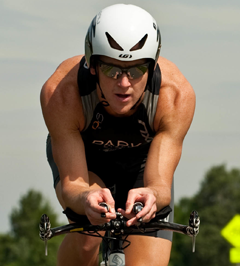
Justin Park is an American professional triathlete whose heart problems date to his high school days.He had several episodes of fainting, or syncope, and was found to have congenital long QT syndrome (LQTS).I’ve written about this condition here at the blog.Individuals with LQTS are predisposed to have episodes of syncope or even sudden cardiac death, so Park received a recommendation that he not continue to participate in sports.A number of years later, his physicians determined that his risk for these problems was not high and he took up triathlon.Interestingly, he has also had difficulty with at least one episode of atrial fibrillation in 2010 that may have been due to underlying thyroid disease. He writes about these issues at his blog.
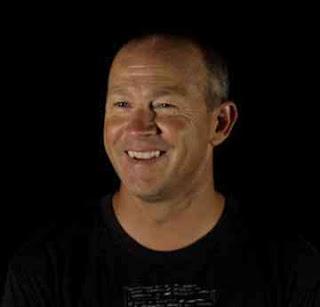
Greg Welch is a retired Australian professional triathlete with a storied career at all distances of triathlon.His victories include the 1990 ITU World Championship, 1993 World Duathlon Championship, 1994 Long Course World Championship, and 1994 Ironman World Championship.His first problems with heart disease manifested during the swim portion of the 1999 Ironman World Champship.He had trouble with breathing that he described as asthma-like.He continued on in the race, had multiple episodes of near-syncope (blacking out), and struggled to an 11th place finish--a remarkable feat.He would go on to compete a week later at the Xterra World Championship before seeking complete evaluation.He was found to have ventricular tachycardia (VT).He’s had a number of heart procedures, including implantation of an internal cardioverter-defibrillator (ICD) that can provide a life-saving shock should the arrhythmia recur.
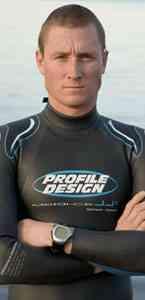
Chris Legh is an Australian professional triathlete who has enjoyed considerable success over many years in long course triathlon, with 2 Ironman wins and many 70.3 wins to his credit. He is also a 6-time Australian champion in Xterra. Starting in 2003 he had difficulties with breathing during the later stages of races that prompted evaluation that disclosed a patent foramen ovale (PFO), a type of atrial septal defect (ASD)--a (usually) small hole in the heart between the left and right atrium. In his case, there must have been enough blood flow through that opening to cause fluid build-up in the lungs and difficulty breathing. I've written here at the blog about athletes and ASD. In a Q&A with Slowtwitch, Legh talks about this condition and other health problems he's dealt with in recent years.
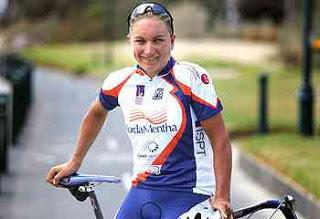 Emma Carney is a retired Australian professional triathlete and one of the greatest Australian triathletes in history. She claims 19 ITU World Cup wins and ITU World Championship titles in 1994 and 1997. She retired from competition in 2004 after suffering a sudden cardiac arrest from which she was successfully resuscitated. Her arrhythmia was ventricular tachycardia (VT) and she underwent implantation of an internal cardioverter-defibrillator (ICD) that same year. Although she was advised not to continue in sports, for fear of recurrent arrhythmias that might cause loss of consciousness as well as a shock from the ICD, she continues to train and compete in various endurance and multisport events. I've written here at the blog about a unique registry at the Yale University School of Medicine, where athletes with an ICD who choose to exercise/train/compete are followed longitudinally in an effort to quantify the actual--not just predicted--risks to the athletes.
Emma Carney is a retired Australian professional triathlete and one of the greatest Australian triathletes in history. She claims 19 ITU World Cup wins and ITU World Championship titles in 1994 and 1997. She retired from competition in 2004 after suffering a sudden cardiac arrest from which she was successfully resuscitated. Her arrhythmia was ventricular tachycardia (VT) and she underwent implantation of an internal cardioverter-defibrillator (ICD) that same year. Although she was advised not to continue in sports, for fear of recurrent arrhythmias that might cause loss of consciousness as well as a shock from the ICD, she continues to train and compete in various endurance and multisport events. I've written here at the blog about a unique registry at the Yale University School of Medicine, where athletes with an ICD who choose to exercise/train/compete are followed longitudinally in an effort to quantify the actual--not just predicted--risks to the athletes. 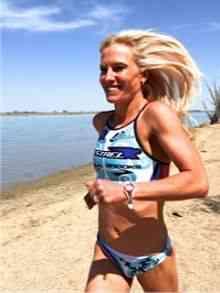 Amanda Lovato is an American professional triathlete who focuses on long course triathlon. She recalls being bothered as early as 2003 with abnormally high heart rates, seemingly without explanation, during both training and competition. Her condition was recently diagnoses as a supraventricular tachycardia (SVT) and she underwent a successful ablation procedure in November, 2012. At her blog, Lovato writes about the troubles leaading up to her diagnosis and shares her experience with the ablation experience and returning to training.
Amanda Lovato is an American professional triathlete who focuses on long course triathlon. She recalls being bothered as early as 2003 with abnormally high heart rates, seemingly without explanation, during both training and competition. Her condition was recently diagnoses as a supraventricular tachycardia (SVT) and she underwent a successful ablation procedure in November, 2012. At her blog, Lovato writes about the troubles leaading up to her diagnosis and shares her experience with the ablation experience and returning to training.
